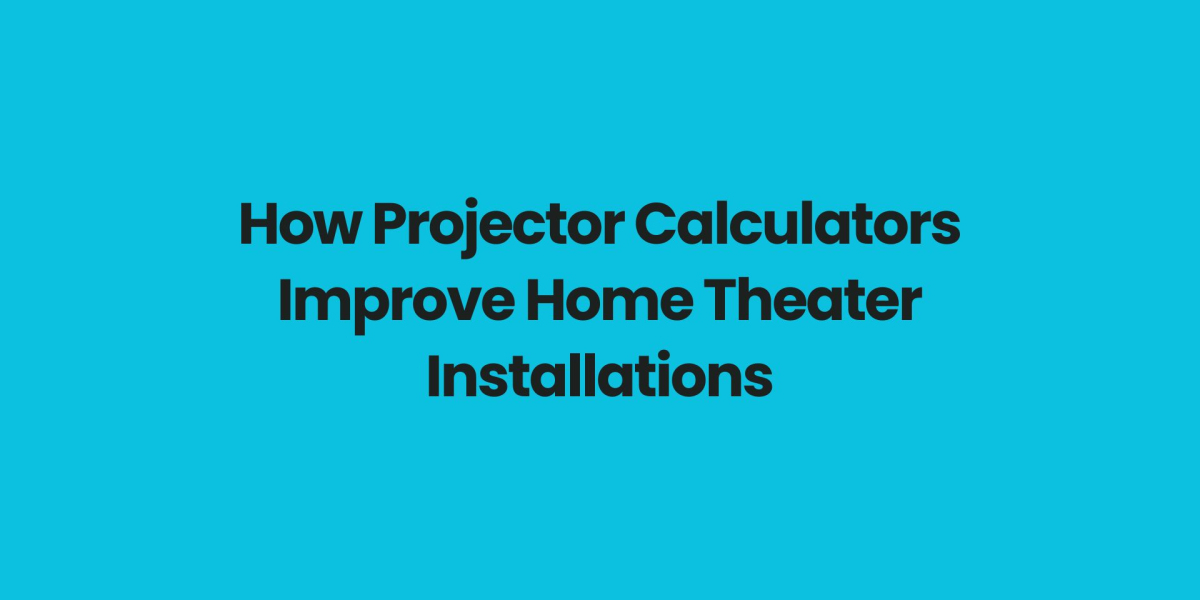Designing and installing a home theater is an exciting project, but it comes with several challenges. Achieving the perfect image size, brightness, and placement requires careful planning and precise calculations. Without proper guidance, even a high quality projector can fail to deliver the desired cinematic experience. This is where a projector calculator becomes an indispensable tool. By providing accurate measurements and recommendations, it ensures that your home theater installation is smooth, efficient, and visually impressive.
In this blog, we will explore how projector calculators improve home theater installations, step by step, and why they are essential for both beginners and professionals.
What Is a Projector Calculator
A projector calculator is an online or software based tool that helps determine the optimal projector placement, throw distance, screen size, and brightness for a given space. By entering key details about your room and projector, the calculator provides precise recommendations that eliminate guesswork.
Projector calculators vary in complexity. Some are brand specific, offering precise data for a particular projector model, while others are general tools that allow manual input of specifications. Advanced tools, such as those offered by XTEN-AV, integrate projector calculators into full AV design solutions, helping professionals plan entire home theater systems with accuracy.
Why Accurate Calculations Are Crucial
Home theater installations involve multiple factors that impact image quality:
Throw Distance: The distance between the projector and screen affects image size and focus.
Screen Size and Aspect Ratio: Choosing the right screen ensures a proportional and immersive viewing experience.
Brightness Levels: Measured in lumens, brightness must match room lighting and screen type.
Screen Gain: The reflective properties of the screen influence perceived brightness and image clarity.
Seating Distance: Proper seating ensures comfortable viewing angles for everyone.
Without precise calculations, you risk a distorted image, washed out colors, or an uncomfortable viewing experience. A projector calculator addresses all these factors and provides actionable recommendations.
How Projector Calculators Improve Home Theater Installations
1. Ensures Accurate Placement
One of the most important aspects of a home theater installation is projector placement. A projector calculator determines the optimal distance from the screen, the correct height, and the ideal angle. This prevents common problems such as keystone distortion, uneven image projection, or images that do not fill the screen properly.
2. Optimizes Screen Size
Choosing a screen that is too large or too small can affect the viewing experience. A projector calculator considers room dimensions, seating distance, and throw ratio to recommend the best screen size. This ensures that the screen is immersive but not overwhelming, and that all viewers have a clear view.
3. Balances Brightness and Screen Gain
Room lighting conditions can significantly impact image quality. A projector calculator factors in ambient light and screen gain to suggest the appropriate projector brightness. This helps avoid washed out images in bright rooms or excessive brightness in dark rooms. Properly balanced brightness enhances clarity, contrast, and color accuracy.
4. Reduces Trial and Error
Before calculators, installers often had to manually test multiple positions and settings, consuming time and resources. A projector calculator minimizes trial and error by providing precise measurements upfront. This streamlines installation, saves time, and reduces the risk of errors that can be costly to fix.
5. Enhances Multi-Projector and Advanced Setups
For large home theaters or panoramic displays, multiple projectors may be used. A projector calculator helps determine proper overlap, alignment, and blending to create a seamless image. Advanced calculators also assist with lens shift, throw ratio adjustments, and advanced calibration, ensuring professional quality results.
Real World Example
Imagine setting up a 120 inch screen in a medium sized living room. By inputting room dimensions, projector model, and desired screen size into a projector calculator, you can instantly get:
Optimal distance from the screen
Recommended projector height and angle
Required brightness to maintain clarity with room lights on
Seating distance for maximum comfort
This guidance allows you to install the projector correctly the first time, avoiding frustration and additional adjustments.
Benefits of Using a Projector Calculator
Time Saving: Eliminates repeated trial and error during setup.
Cost Efficiency: Prevents overbuying high lumen projectors or oversized screens.
Professional Results: Ensures image clarity, proper alignment, and accurate brightness.
Flexibility: Adapts recommendations for different rooms, projector models, and screen types.
Improved Viewing Experience: Provides optimal image quality for all viewers.
Tips for Using a Projector Calculator Effectively
Measure your room accurately, including ceiling height and furniture placement.
Factor in screen gain and ambient light to determine brightness needs.
Double check seating distance to ensure comfort.
Use calculator results as a guideline but test placement physically before final installation.
Consider advanced features like lens shift or keystone correction for flexible positioning.
Conclusion
A projector calculator is a vital tool for anyone looking to achieve a high quality home theater installation. It simplifies complex calculations, ensures accurate placement, and optimizes screen size and brightness for the best viewing experience. Whether you are a beginner setting up your first home theater or a professional AV installer, using a projector calculator can save time, reduce errors, and deliver professional results.
XTEN-AV provides advanced projector calculators integrated into full AV design solutions, making home theater installations more efficient and accurate than ever before. By leveraging these tools, you can transform your space into a cinematic experience that rivals professional theaters.
Read more: https://logcla.com/blogs/846342/What-Is-a-Projector-Calculator-and-Why-Do-You-Need







